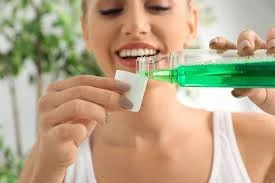
Best Mouthwash for Fresh Breath and Dental Health: Top Picks for Oral Hygiene
- Understanding Mouthwash and Its Benefits
- Why Mouthwash is Essential for Fresh Breath and Dental Health
- How to Choose the Right Mouthwash for Fresh Breath and Dental Health
- Top Mouthwash Recommendations for Fresh Breath and Dental Health
- Natural vs. Chemical Mouthwash: What You Need to Know
- Real-Life Testimonials: How Mouthwash Improved My Oral Health
- Common Mistakes to Avoid When Using Mouthwash
- When to Seek Dental Care: Mouthwash Alone Isn't Enough
Understanding Mouthwash and Its Benefits
Mouthwash is an essential part of daily oral hygiene, offering numerous benefits that complement brushing and flossing. Its primary function is to help eliminate bacteria, fight bad breath, and improve overall dental health. When used correctly, mouthwash can target areas in the mouth that toothbrushes and floss can't reach, promoting fresh breath, healthier gums, and stronger teeth.
There are various types of mouthwashes on the market, each formulated to address specific oral health issues. Some mouthwashes are designed for fresh breath, while others target gingivitis, plaque, or even tooth sensitivity.
Why Mouthwash is Essential for Fresh Breath and Dental Health
The importance of mouthwash goes beyond simply masking bad breath. Regular use of mouthwash can help kill bacteria, reduce plaque buildup, and improve gum health, all of which contribute to better overall dental hygiene. Here are some key reasons why mouthwash is essential:
1. Freshens Breath
One of the most obvious reasons for using mouthwash is to freshen your breath. Mouthwashes designed for fresh breath often contain antibacterial agents that fight the bacteria responsible for bad breath, leaving your mouth feeling clean and refreshed.
2. Helps Prevent Gum Disease
Mouthwash with fluoride or antimicrobial agents can help reduce the risk of gum disease by fighting the bacteria that cause gingivitis and plaque buildup. It also helps reduce inflammation in the gums, which is critical for maintaining healthy oral tissue.
3. Enhances Overall Oral Hygiene
While mouthwash should never replace brushing and flossing, it plays a vital role in enhancing your oral hygiene routine. By reaching areas in the mouth that are difficult to clean with a toothbrush, mouthwash provides an additional layer of protection.
How to Choose the Right Mouthwash for Fresh Breath and Dental Health
With so many options on the market, choosing the right mouthwash for fresh breath and dental health can be overwhelming. Here are a few key factors to consider when selecting the best mouthwash for your needs:
1. Consider Your Oral Health Needs
Different mouthwashes target different issues. For example, if you're looking to combat bad breath, you may want a mouthwash that has antibacterial properties. If you're aiming to strengthen enamel and protect against cavities, look for mouthwashes with fluoride.
2. Choose Alcohol-Free Mouthwash for Sensitive Gums
Alcohol-based mouthwashes can sometimes cause dryness or irritation in the mouth, especially for those with sensitive gums. Opting for alcohol-free mouthwash can provide a gentler alternative that still delivers excellent results.
3. Look for ADA (American Dental Association) Seal of Approval
The ADA Seal of Approval ensures that the mouthwash has been tested for safety and efficacy. Choosing a product with this seal can help you ensure that you're using a reliable and effective mouthwash.
Top Mouthwash Recommendations for Fresh Breath and Dental Health
Based on various factors like effectiveness, flavor, and price, here are some of the top mouthwash recommendations for fresh breath and dental health:
1. Listerine Total Care
Listerine is one of the most well-known mouthwash brands, and for good reason. Listerine Total Care provides comprehensive oral care, helping to fight plaque, kill bacteria, and freshen breath. It's a great all-around mouthwash that promotes overall dental health.
2. Crest Pro-Health Multi-Protection
Crest Pro-Health is known for its ability to fight plaque and gingivitis while also freshening breath. It's alcohol-free, making it a gentle option for those with sensitive mouths. It also strengthens enamel, helping to protect against cavities.
3. TheraBreath Fresh Breath Oral Rinse
If bad breath is your primary concern, TheraBreath Fresh Breath Oral Rinse is highly recommended. It uses oxygenating compounds to neutralize odor and bacteria, providing long-lasting fresh breath without the burn of alcohol.
4. Tom’s of Maine Natural Mouthwash
For those who prefer natural products, Tom’s of Maine offers a fluoride-free, alcohol-free mouthwash made with natural ingredients. It’s a great option for people who are looking for a gentle mouthwash that’s also effective in fighting bad breath and bacteria.
Natural vs. Chemical Mouthwash: What You Need to Know
One of the key decisions when choosing a mouthwash is whether to opt for a natural or chemical-based product. Natural mouthwashes typically use essential oils, herbs, or other plant-based ingredients, while chemical-based mouthwashes often contain fluoride, alcohol, and antimicrobial agents.
Natural mouthwashes are usually gentler and have fewer side effects, but they may not be as effective at killing bacteria or preventing cavities as chemical mouthwashes. Ultimately, the choice depends on your preferences and oral health goals.
Real-Life Testimonials: How Mouthwash Improved My Oral Health
Many people who have switched to a consistent mouthwash routine have reported significant improvements in their oral health. For example, John, a 38-year-old professional, struggled with persistent bad breath for years. After incorporating Listerine Total Care into his daily routine, his breath improved dramatically, and his dentist noticed a decrease in plaque buildup during his regular checkups.
Stories like John's highlight the real-life benefits of mouthwash, proving that a good mouthwash can be a game-changer in your oral hygiene routine.
Common Mistakes to Avoid When Using Mouthwash
While mouthwash is an excellent addition to your oral care routine, there are a few common mistakes people make when using it:
1. Swishing Too Quickly
It's important to swish the mouthwash around your mouth for the recommended amount of time—typically around 30 seconds—to ensure that it has enough time to work.
2. Using Mouthwash Right After Brushing
Some people use mouthwash immediately after brushing their teeth, but this may wash away the concentrated toothpaste ingredients. It's best to use mouthwash at a different time or wait a few minutes after brushing.
When to Seek Dental Care: Mouthwash Alone Isn't Enough
While mouthwash can help with freshening breath and improving oral hygiene, it shouldn't be seen as a replacement for professional dental care. If you experience persistent pain, swelling, or bleeding gums, it's important to consult with your dentist.


 Reflections Dental Care4.0 (231 review)
Reflections Dental Care4.0 (231 review) Bluff Creek Dental4.0 (221 review)
Bluff Creek Dental4.0 (221 review) Ideal Smile Dentistry4.0 (135 review)
Ideal Smile Dentistry4.0 (135 review) Nashua Dentistry and Orthodontics for Children4.0 (370 review)
Nashua Dentistry and Orthodontics for Children4.0 (370 review) Kelly Orthodontics5.0 (14 review)
Kelly Orthodontics5.0 (14 review) ChapCare by AltaMed Medical and Dental Group — Pasadena, Fair Oaks3.0 (47 review)
ChapCare by AltaMed Medical and Dental Group — Pasadena, Fair Oaks3.0 (47 review) The Importance of Oral Health Education During Pregnancy for a Healthy Pregnancy
The Importance of Oral Health Education During Pregnancy for a Healthy Pregnancy Best Tips for Brushing Your Teeth Properly for Healthy Gums: Essential Techniques for Oral Health
Best Tips for Brushing Your Teeth Properly for Healthy Gums: Essential Techniques for Oral Health Why Skipping Dental Checkups Can Lead to Bigger Oral Health Problems
Why Skipping Dental Checkups Can Lead to Bigger Oral Health Problems Advantages of Porcelain Dental Restorations
Advantages of Porcelain Dental Restorations How Can Diabetes Cause Tooth and Gum Problems? Preventing and Managing Oral Health Issues
How Can Diabetes Cause Tooth and Gum Problems? Preventing and Managing Oral Health Issues Healthy Habits for Promoting Good Oral Health and Hygiene: Tips for a Healthy Smile
Healthy Habits for Promoting Good Oral Health and Hygiene: Tips for a Healthy Smile